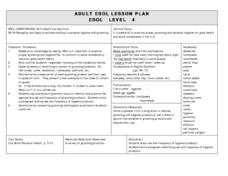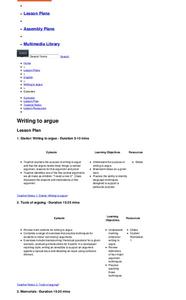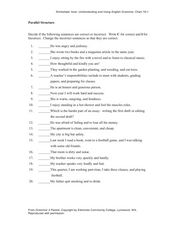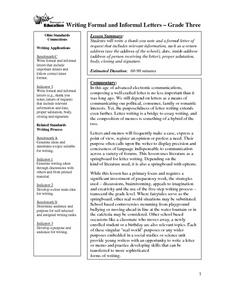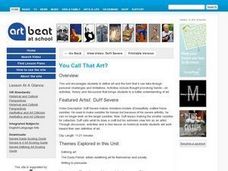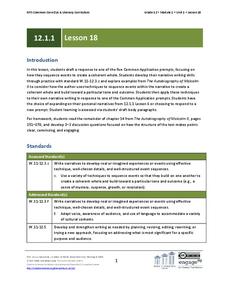Curated OER
Writing - The Persuasive Essay
Young scholars, in groups, work together to develop a five-paragraph essay that defends the group's viewpoint on an assigned topic. Each student in the group writes one paragraph.
Curated OER
That Was Then - Persuasive Essay
Student explain how geographic and cultural settings influence a person's identity. They compare and contrasting Esmeralda Santiago's Puerto Rican self with her American self by participating in a close reading of the text and writing a...
Curated OER
Personal Hygiene Products and Their Uses
Learners explain the use and frequency of use of personal hygiene products by writing an essay explain their personal hygiene regimine and the products they use. This lesson is intended for students acquiring English.
Curated OER
Writing Catchy Introductions
In this introductory paragraph worksheet, students learn techniques for writing an attention-catching introductory paragraph. Students then read several introductory paragraphs and determine which strategies were used.
Curated OER
Review Steps in the Writing Process and Explore a Poem
Students practice their persuasive writing skills. In this writing process instructional activity, students write essays that meet the requirements of the included text element worksheets and analyze poetry of their choosing.
Curated OER
Writing to Argue
Students write an argument using a clear structure and argumentative techniques. In this persuasive writing instructional activity, students brainstorm, write, and peer edit an argumentative essay. Worksheets include the prompt, facts...
Curated OER
Writing Bug- Famous Parents
For this writing prompt worksheet, student write an open response essay in response to the prompt, "If you could choose two famous people to be your parents, who would you choose? Your chosen parents can be alive today, or they might...
Curated OER
Writing: Parallel Structure
In this writing with parallel structure worksheet, students examine 20 sentences and note whether they are correctly or incorrectly written in terms of parallel structure.
Curated OER
Cover Letter: Completing and Organizing Your Personal Job Portfolio
Young scholars work on their career portfolio. In this written communication lesson plan, students discuss the purpose of cover letters, read sample cover letters, and then write their own.
Curated OER
Writing Formal and Informal Letters
Third graders write a thank-you note and a formal letter of request that included relevant information, such as a return address, date, inside address, proper salutation, body, closing, and signature. They write an imaginary letter to...
Curated OER
Change of Perspective
After reading an example of a Cultural Connection about a particular person, class members are asked to think about what this person might experience on a daily basis. They then craft a narrative from the subject’s point of view.
Curated OER
Dr. Heidegger's Experiment
What are the pros and cons of prolonging life? Incorporate real-world issues into the study of literature using Dr. Heidegger's Experiment. Through the exploration of pre-determined websites, scholars consider several related...
Curated OER
You Call That Art? - Activity 1
Learners formulate a definition of art in the introductory lesson for a unit on various art forms. The learning emphasis is placed on Oregonian artist Duff Severe and reflective writing. Students compose an essay describing various art...
Curated OER
Persuasive Writers
Use the power of the pen to persuade others to get involved in community issues! Individuals reflect on personal service learning activities and the writing process. They compose essays regarding service to others. While designed for...
Curated OER
History Personified
In 1856 Congressman Preston Brooks of South Carolina beat Senator Charles Sumner of Massachusetts over the head with a cane. This event, which highlighted the acrimonious debate over the expansion of slavery, is the focus of a paper...
Curated OER
Message in a Bottle
Young scholars acquire a pen pal in a foreign country and write letters at least twice a month throughout the year to exchange with them. At the end of the year, they write an essay that compares one important difference and one...
Curated OER
My Name is___________.
Read to gain an understanding of the author's intent or purpose. Learners analyze a persuasive text, identify the author's purpose, and evaluate the claims used as support. They then compose a persuasive essay of their own.
Curated OER
The World Around Me
Combining visual and language arts, here is a resource that prompts middle schoolers to write stories based on pictures of their surroundings. They use digital cameras to take pictures of favorite areas in the school. Next, they choose...
Museum of Tolerance
Just What Kind of American Are You?
Your parents were both in different countries. You were born in the US. Documents and application forms ask you to identify your racial or ethnic classification. Which box do you check? Class members collect documents...
Curated OER
“Self Reliance” by Ralph Waldo Emerson
“Nothing is at last sacred but the integrity of your own mind.” Readers not only identify aphorisms in Emerson's "Self Reliance," but also find evidence of transcendental elements contained in the essay. They also demonstrate consistency...
EngageNY
Mid-Unit Assessment: Analyzing a New Narrative about a Natural Disaster, Part II
See it through my eyes. Scholars complete mid-unit assessment part II by writing an essay describing how the narrator's point of view influences how the story is told in the text In the Middle of the Storm. Pupils also complete a...
Museum of Tolerance
And Justice for All? Slavery Not Just in the Past
Slavery in India, Sudan, and Mauritania? What about in the United States? Groups research modern slavery in these four countries, collecting factual evidence (What), determine their feelings about this evidence (So what),...
EngageNY
Grade 12 ELA Module 1: Unit 1, Lesson 18
Class members take a break from discussing The Autobiography of Malcolm X to focus on their personal narrative essays. Before working on their drafts, they review what they have learned from their study of Haley's narrative about...
Curated OER
Trek Across America
Bring a time machine into your classroom with this writing lesson, in which young writers project themselves back in time and have a variety of choices from that point forward. They either write a conversation with a historical figure,...




